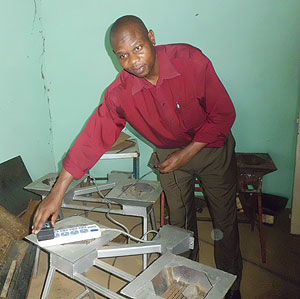Four months back, Aimable Mugabo, was engaged in welding activities but only if a customer presented him with something to do.Currently, the 40 year old has come up with a plan to start a business where he buys materials to make metallic doors, windows and cost effective eco-friendly stoves which do not use charcoals.


Four months back, Aimable Mugabo, was engaged in welding activities but only if a customer presented him with something to do.Currently, the 40 year old has come up with a plan to start a business where he buys materials to make metallic doors, windows and cost effective eco-friendly stoves which do not use charcoals."Right now I do not have to wait for customers to work. I make my products and then sell them to whoever wishes to purchase them,” said Mugabo.Mugabo is one of the 2012 beneficiaries of Digital Opportunity Trust (DOT) Rwanda`s StartUp! Programme aimed at building entrepreneurs’ capacity and also aspiring in terms of business planning and management. "During that one month training, I got to know how best I can do business including the marketing strategies and how to keep my accounts books to help make my business grow,” he said.Mugabo who completed his training in December with others said that he has also encouraged many others to go for training so that they too can benefit from it.The price free programme is being conducted at Masaka Business Incubation Center (MBIC) and Integrated Polytechnic Regional Center (IPRC) in Kicukiro district and ADB Nyarutarama respectively.One of the participants at MBIC, Vincent Ndahimana, a private veterinary officer, expects the training to improve or at least solve some of the problems he has experienced in his business."I missed out on implementing my plans of setting up a pharmacy because of the limited capital, but I am sure with my current business plan, I shall be able to secure a loan from some of the financial institutions.”"I have already started making business plans for people and I am paid for my services,” said Ndahimana.Daphin Umutoni is another trainee who believes that the training will change her life. She deals in ladies wear at Kabuga in Gasabo district."I now know when and where to buy my goods in terms of minimizing losses as well as looking for the market,” she said.Umutoni pointed out that among others; she has learnt that dealing with insurance companies will help to safe guard her business in case of any danger.One of the trainers at the centre, Marie Claire Mukeshimana, said that for the first week, trainees are given the chance to get computer skills in preparation for effective training."This is just to introduce them to the ICT field. Although some have the skills, others need the introductory part,” she said.Speaking to The New Times, one of the trainees who reported for the second day, Clotride Bayizera, said that she is optimistic about the time she will spend at the centre. She is sure it will be beneficial."This is a great opportunity in my life because for the first time, I am using a computer. It was never in my expectations,” said 34 year old Bayizera.She called in for more effort by DOT Rwanda and other developing partners to come up with similar initiatives urging that it will attract more people."There are many people out there who have not got this chance and for that, I consider myself lucky but it’s important that these skills are acquired by many,” she said.However, although Buyizera believes that more effort should be done to empower others, another trainer at the IPRC Kigali, Bernadette Kambundi, said that the chances are already available."Initially we were challenged with women participation but through mobilization, we have approached women cooperatives and associations whose members are training with us,” Kambundi said.Marie Chantal Uwitonze, a trainee at IPRC Kigali said that after undergoing such training she has decided to join the business world."Professionally, I did tourism and hotel management but then decided to join business and I am happy with what I earn per month,” Uwitonze expressed. Moses Gahigi Kayizzi, in charge of the StartUp Programme, said that this is a pilot project which will later be extended to other parts of the country. "The programme received a good reception from the beneficiaries and partners due to its relevance in the country’s economy; in the next few months we shall scale it up to other parts of the country”. He further noted that the programme has not only provided functional business management skills, but has also helped in overcoming the fear of risk and cultivated a culture of saving and starting small which are both needed to boost the private sector. "The saving culture and motivation to start small are critical cultures that aspiring entrepreneurs need to practice, it is another advantage that StartUp comes with,” noted Gahigi. "At the end of the StartUp Programme we would have enabled participants to develop bankable businesses. This to us is a major success,” stated DOT Rwanda’s Country Director, Violette Uwamutara. She also observed that the programme plays a role in overcoming the challenge of access to finance which is a major hindrance to start ups and businesses in general. "Financial institutions tend to find start ups and small business operators risky because the majority does not have the necessary skills to do business and also pay the loan. So they shun them and that is why StartUp is here; to minimise that risk,” observed Violette.


